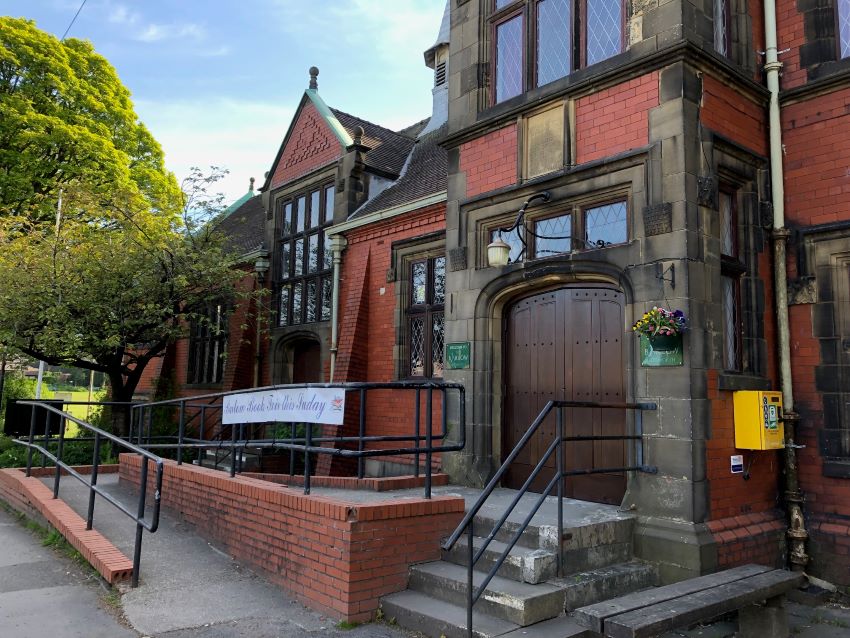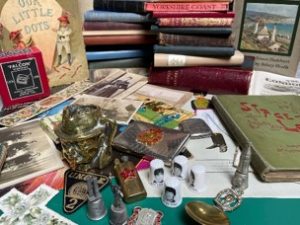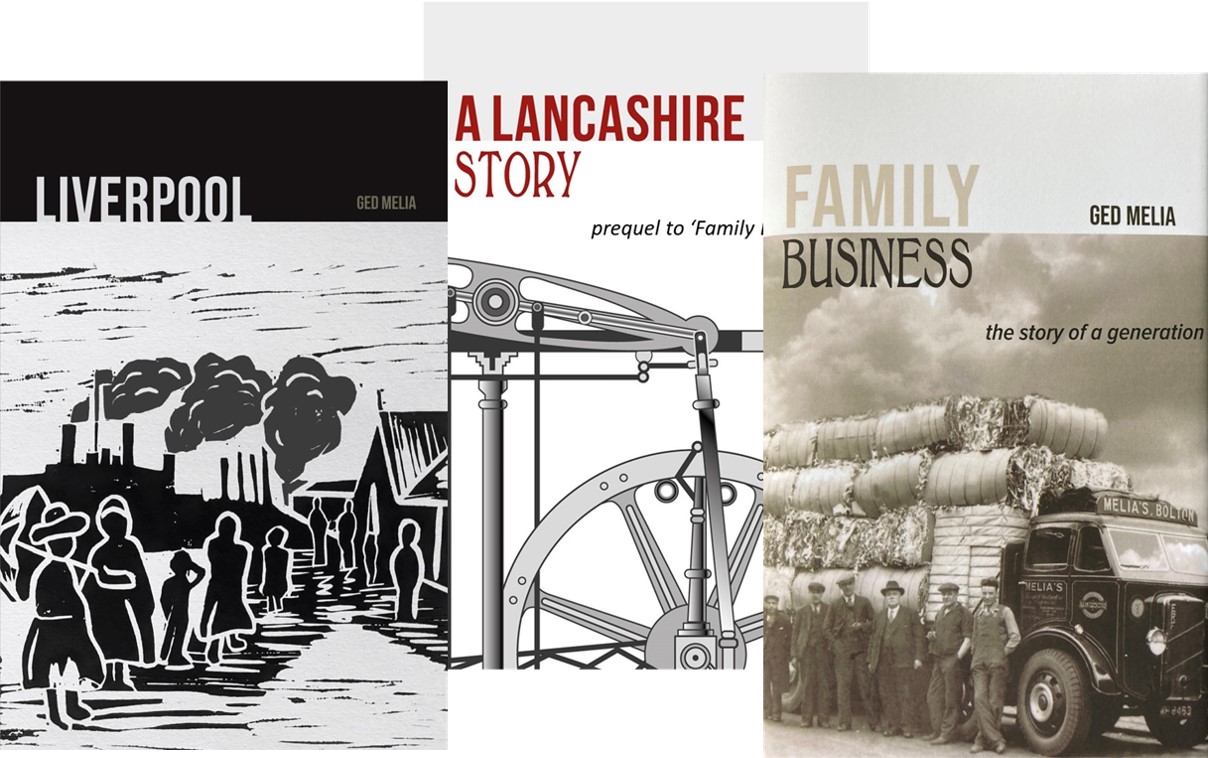About the author & books
I am married with two adult children and live on the West Pennine Moors, about five miles from Bolton in the North West of England. My career has been defined by its evolution from one area to another. I’ve been an accountant, a general manager and a management consultant and have worked in various parts of the world. My wife and I are now semi-retired, although we are increasingly involved in selling second hand books and ephemera from time to time, some voluntary work, and occasional consultancy work. I have a theoretical physicist trained son involved in software development, a daughter working for Oxford University in biological research science and a wife who is virtually unbeatable at Scrabble. Conversation is rarely uninteresting.
‘Family Business’ was my first novel and starts with a prologue twenty years before the real story begins. It is the end of the Victorian century and beginning of a new one, and Great Britain still stands at the zenith of its power. The ‘Great War’ is still some years away and the rise of Germany and the United States, while vaguely threatening, are not yet a matter for concern. Armed with an education, Austin (‘Senior’) has high hopes both for himself and his family. Brought-up the son of a miner, and in relative austerity, he has managed to break free from the cycle of poverty and become a respected steam engineer. Despite his father’s untimely death, he is now married and has a young family himself. The occasion is sombre but he is still full of optimism.
Set during the inter-war years, ‘Family Business’ is about a generation aspiring to improve its lot through building a road haulage business, from a single “solid-tyred horror”, a lorry, to a national company with dozens of employees. Initially situated in the industrial landscape of a grey and soot-stained Bolton of the 1920s and 1930s, the family story expands along with the growth of the business, into London, Liverpool, Blackpool and Warrington. Anchored on historical fact, newspaper reporting and family anecdote, religious and social tensions between family members are explored, as are the challenges they faced in the lives they led.
‘A Lancashire Story’ was a second novel and is a prequel to ‘Family Business’. Written in a similar style to first, the story starts in the early 1890s and ends just after the First World War in 1919. Although factually based, far more creative license has been used to fill in the gaps, adding a bit of colour and circumstance to what might have been little more than a basic list of people, times and events. The earlier the events, the less facts there are to work with and the more creative I have had to be.
‘Liverpool’, my third novel, is a distant prequel to ‘A Lancashire Story’ and ‘Family Business’, the partly factual narratives chronicling the story of a family between 1890 and 1950. The book starts around 1840 and ends around 1853. Although again inspired by fact, yet more creative license has been used to fill in the even larger gaps, adding colour and circumstance in a similar way to the earlier novels.
How I started writing
My journey in writing the first book started in the late 1970s, not long before the death of my grandmother, Catherine Melia. I seem to recall a conversation in which she let slip the name of someone I had never heard of before, ‘Ted’ Melia. I cannot remember if I asked at the time, but I do recall her indicating that he was the ‘black sheep’ of the family. She did not elaborate on why she regarded him as the family villain or give anything at all away in terms of details. It would be some years later before I found out any more.
Life intervened. I got married, had exams to pass and a career to start building. It was a dozen years before the subject appeared again. I was quite interested in the story behind the family transport business, and how it managed to suddenly disappear. It was this interest that prompted a number of conversations with Austin Melia (‘Junior’), my own uncle. Austin had worked for Melia’s Transport after completing his national service and knew ‘Uncle Ted’ quite well. Austin could tell me about what had happened to the company, who this Edward was, and what he had done to warrant his unflattering ‘black sheep’ moniker.
Photographs and documents appeared from forgotten albums and files, and the stories and anecdotes about those war years and earlier were shared. I was told that Edward had been sent to prison ‘after the war’ and that it had something to do with stolen cars. His life story sounded fascinating and I basically got the bug. I needed to know more, not just about who I now knew was my ‘Great Uncle Ted, but about the whole generation, including the grandfather I never met. For a time I settled for building a family tree, a couple of generations, but it was really the stories around the inter-war generation that got my attention. More documents, photos, and stories were exhumed, including the full tale behind the ‘crime’. Having established an outline understanding of the ‘generational story’, it became clear that there was more to it than just Edward. It was also the story of a wider family, and of a family owned business, from birth to a premature death at the hands of an arguably well-intentioned government, undertaking a highly politicised act of national corporate vandalism. This final act, nationalisation, irked not just my grandfather but my father and uncle. My grandfather’s generation felt cheated out of something they had built from nothing over a thirty-year period, and my father, no less than forty years after the event, would still refer to the Labour Party’s act in highly derogatory terms. He had acquired a genetic dislike of Socialism.
Why did I start writing my first novel, ‘Family Business’, and why the others?
Well, family history is interesting but only up to a point. A document, a newspaper article, a headline or an anecdote is just what it is; an ephemeral and often isolated fragment of time. These shattered fragments are simply not enough in themselves to tell a story. To make the past more interesting needed life, people, characters, personalities, circumstances and a whole lost environment reanimated. It required issues and conflict, and the whole array of nuance, jealousy, rivalry, love, like, dislike, affairs, aspiration, disappointment, births and deaths; the kinds of things you find in almost all family situations and social circles, with emotions often magnified in a family business. Thus, the book was born. An attempt to infuse an almost forgotten generation of the family with some life.
The second novel, ‘A Lancashire Story’, was written as a prequel to the first and is slightly less biographic -the facts are simply not there to work with. Readers of ‘Family Business’ did ask for a sequel, but a prequel seemed like a better idea. At the time of writing I had also uncovered one or two more additional pieces of biographic detail, and felt that there was just about enough for a full story. A sequel, perhaps spanning the 1950 – early 1970s may follow in time, although creating fictional narrative about people still living is not without its diplomatic challenges.
Liverpool’ was inspired by an interest in the history of the Irish experience in Liverpool during the mid-nineteenth century. As with the others I have tried to infuse the narrative with contemporary facts, events, and the real life experience of impoverished working class people living in the city at the time. It is perhaps a hard read, but then they were hard times. My sense is that it would have been a disservice to my ancestors to present their life as anything other than a struggle to survive. It is almost entirely a fictional story.
I have tried to write books that tell a stories rather than create a works of art. Florid and highly introspective narrative would not really have worked. While none of my novels are of the action thriller type they nonetheless need to move along at a respectable pace or, quite frankly, they would probably have ended up much longer than they are.
With luck my fascination with history will permeate through into your enjoyment of each of my stories.
Business books
In 2009 I wrote a change management themed business book, ‘Experiencing Change’, which derived most of its advice from nearly twenty years in the rapidly changing world of cable telecoms. It was published in 2010 by Management Books 2000 Ltd. Copies are harder to find than they once were but there are still a few around. A synopsis of its chapters can be found on the sub-menu to this one, here.


